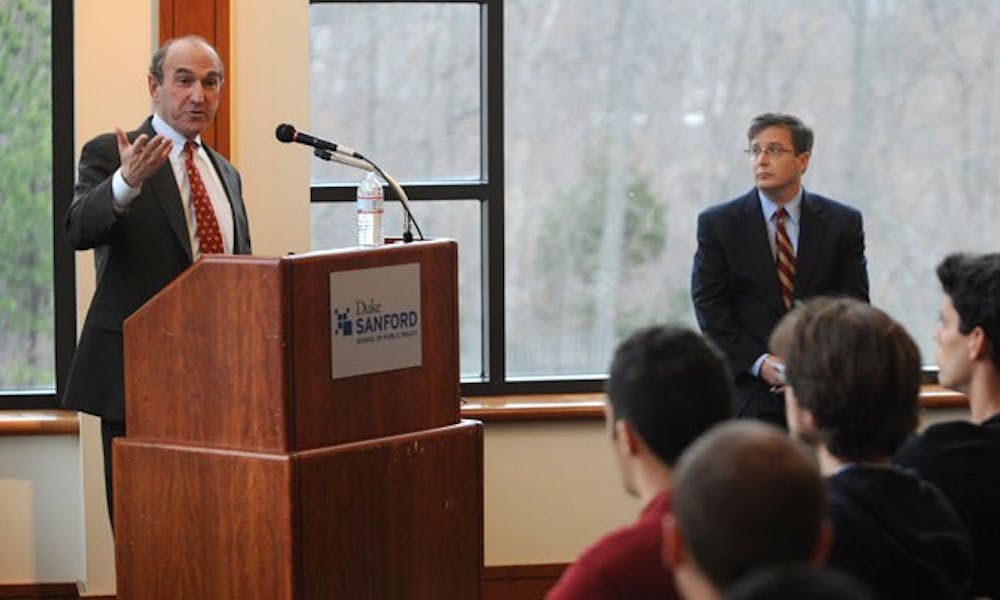Former White House Adviser Elliott Abrams discussed issues facing U.S. foreign policy as it tries to democratize other nations, especially in the Middle East, in his speech Tuesday.
Abrams addressed a diverse, packed room of students and adults in the Sanford School of Public Policy in an event titled “The Freedom Agenda and the Middle East.” Sponsors of the event included the von der Heyden Fellows Program Endowment Fund and the Duke University Program in American Grand Strategy.
Although the United States has traditionally played an important role in spreading democracy to other nations, Abrams said it will need to toughen its engagement to bring substantial changes to the Middle East.
An adviser to both former presidents Ronald Reagan and George W. Bush, Abrams argued that democracy is necessary for nations to function. He referenced many countries, including those in the Middle East.
“No culture is resistant to democracy,” he said.
Abrams said the Bush administration and President Barack Obama’s administration have not lived up to the role America should be playing in spreading democracy. By engaging in conferences with opposition leaders, the United States considers the opinions of heads of states more than the needs of “millions of people they are oppressing,” he said.
Abrams also noted that Obama’s approach to world politics is often to “reach out to previously scorned regimes.” In doing so, however, the administration implicitly accepts some of the wrongdoings of those governments, he said.
“If that’s what we mean by engagement, I reject it,” Abrams said.
Calling Egyptian President Hosni Mubarak “Pharaoh” in jest, Abrams recounted that the foreign leader became so upset with Bush administration policies that Mubarak canceled his annual spring visits to the United States until Bush left office.
When asked in the question and answer session about the future of nuclear weapons in Iran, Abrams replied that it “will be catastrophic.” Now that Iran has ignored U.S. and United Nations pleas not to build nuclear weapons, other countries can feel more confident in building their own without approval.
“I think the lesson of that to other countries is that the non-proliferation treaty is dead,” Abrams said. “No one is going to stop you.”
The foreign policy expert further expressed concern that America simply appeases foreign powers.
“Nothing good comes of being nice [to oppressing groups],” he said.
Only after weakening these groups should the U.S. give them a political way out which could lead them to embrace a democratic system, Abrams said.
Sophomore Danni Lin attended the event after taking PS93: “Introduction to International Relations” with Peter Feaver, professor of political science and co-director of the American Grand Strategy program.
“[Abrams] made some really great points... on controversial topics,” Lin said.
Lin said she hopes to become more involved in American Grand Strategy and plans to attend the next installment of the von der Heyden lecture series as well.
In the question and answer session, Abrams compared Britain 50 years ago to many Arab countries now. He noted that many of these countries outlaw criticism of their leaders but are developing along the right path. Abrams said, however, that with the proper influence the United States can continue to democratize Middle Eastern countries.
Get The Chronicle straight to your inbox
Sign up for our weekly newsletter. Cancel at any time.

